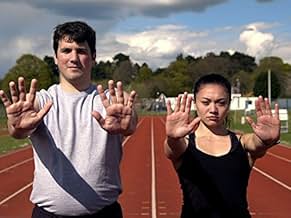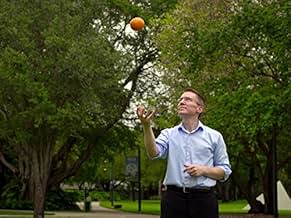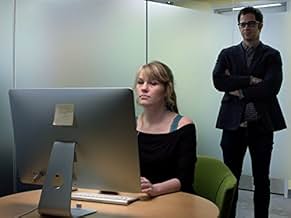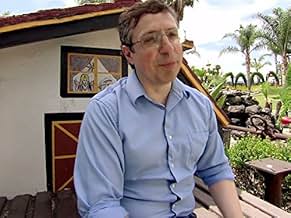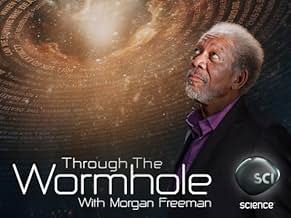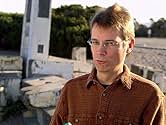Morgan Freeman explores humanity's biggest questions: our composition, what preceded existence, if we're alone in the universe, and whether there's a creator - mysteries that have challenged... Read allMorgan Freeman explores humanity's biggest questions: our composition, what preceded existence, if we're alone in the universe, and whether there's a creator - mysteries that have challenged our greatest minds.Morgan Freeman explores humanity's biggest questions: our composition, what preceded existence, if we're alone in the universe, and whether there's a creator - mysteries that have challenged our greatest minds.
- Nominated for 2 Primetime Emmys
- 4 nominations total
Browse episodes
Summary
Reviewers say 'Through the Wormhole' is lauded for its exploration of advanced scientific theories and Morgan Freeman's narration. It delves into quantum mechanics, the multiverse, and consciousness. However, critics note a lack of skepticism, blending speculative theories with established science, and occasional pseudoscience. Some find it thought-provoking and educational, while others argue it oversimplifies complex topics and presents misleading information. The series is also critiqued for its approach to religious and philosophical questions, often merging science with spirituality.
Featured reviews
I used to love this show. It revealed fascinating developments at the forefront of neuroscience, genetics, exobiology, and so forth.
It has degenerated to nearly useless. I shall provide an example drawn from this evening's new episode, "Do We Live in the Matrix?" whereby it is opined--and, ostensibly, justified--that we could very well be living in a computer simulation.
We meet a renowned Swiss AI expert. He tells us there's no need to express pi in so many zillions of digits that wrap around the globe ad infinitum: we can just put "C/d"--where, of course, C is circumference and d is diameter.
Uh . . . the difference is that the first one is practical (I can measure off 3.14159... inches.) The other is purely notational (I cannot measure off C/d inches.)
The same expert tells us that, "I can express the entire universe in ten lines of code," and beams with pride as he presents an extremely vague and general algorithm in an ALGOL-like PDL.
Uh . . . in a suitably high-level language, I can express the entire universe in ONE SYMBOL of code. SO WHAT: what PRACTICAL, IMPLEMENTABLE purpose is accomplished?
Another scientist shows some symmetric matrices to mathematicians without any commentary and is disappointed that they don't get excited. When he builds corresponding models of atomic structures, then everyone's excited.
Perhaps if he had TOLD them they were looking at symmetric spin tensors within a Lie algebra, they would have achieved a meaningful apotheosis. Instead, we hear snippets of some meaningless argument about bits and bytes and shmits.
(I recall from a previous episode--although it's in the same vein--that some physicist claimed that, if he builds such and such a fiber optic circuit, he can go backwards in time by 10 to the -18 seconds. I presume that even a physicist realizes that this is completely unmeasurable and thus unverifiable: sending the data from the measuring device to the managing computer takes literally billions of times longer than the 10 to the -18 seconds putatively recovered. I know, I know, physicists pooh-pooh anything that isn't physics as beneath them, but I don't think that's the issue here.)
I SEE WHAT THE PROBLEM IS HERE: the producers of the show have ZERO understanding of the concepts being discussed, Morgan Freeman's golden throat notwithstanding. This, combined with the PERPETUAL problem that participating experts in TV shows experience, viz., that pieces and snippets of their cogent essays are quoted out of context, results in a stream of meaningless dribble that endeavors to sound technical in its misapplied terminological splendor but ends up delivering just so much imbecility in sheep's clothing, albeit dressy and richly ornamented.
What a PROFOUND disappointment!
(FYI, the popular go-back-in-time theme is utterly impossible. This is trivially easy to demonstrate. Suppose I set a box on my kitchen table and send it into the past. IT WOULD HAVE BEEN THERE YESTERDAY! Case closed.)
It has degenerated to nearly useless. I shall provide an example drawn from this evening's new episode, "Do We Live in the Matrix?" whereby it is opined--and, ostensibly, justified--that we could very well be living in a computer simulation.
We meet a renowned Swiss AI expert. He tells us there's no need to express pi in so many zillions of digits that wrap around the globe ad infinitum: we can just put "C/d"--where, of course, C is circumference and d is diameter.
Uh . . . the difference is that the first one is practical (I can measure off 3.14159... inches.) The other is purely notational (I cannot measure off C/d inches.)
The same expert tells us that, "I can express the entire universe in ten lines of code," and beams with pride as he presents an extremely vague and general algorithm in an ALGOL-like PDL.
Uh . . . in a suitably high-level language, I can express the entire universe in ONE SYMBOL of code. SO WHAT: what PRACTICAL, IMPLEMENTABLE purpose is accomplished?
Another scientist shows some symmetric matrices to mathematicians without any commentary and is disappointed that they don't get excited. When he builds corresponding models of atomic structures, then everyone's excited.
Perhaps if he had TOLD them they were looking at symmetric spin tensors within a Lie algebra, they would have achieved a meaningful apotheosis. Instead, we hear snippets of some meaningless argument about bits and bytes and shmits.
(I recall from a previous episode--although it's in the same vein--that some physicist claimed that, if he builds such and such a fiber optic circuit, he can go backwards in time by 10 to the -18 seconds. I presume that even a physicist realizes that this is completely unmeasurable and thus unverifiable: sending the data from the measuring device to the managing computer takes literally billions of times longer than the 10 to the -18 seconds putatively recovered. I know, I know, physicists pooh-pooh anything that isn't physics as beneath them, but I don't think that's the issue here.)
I SEE WHAT THE PROBLEM IS HERE: the producers of the show have ZERO understanding of the concepts being discussed, Morgan Freeman's golden throat notwithstanding. This, combined with the PERPETUAL problem that participating experts in TV shows experience, viz., that pieces and snippets of their cogent essays are quoted out of context, results in a stream of meaningless dribble that endeavors to sound technical in its misapplied terminological splendor but ends up delivering just so much imbecility in sheep's clothing, albeit dressy and richly ornamented.
What a PROFOUND disappointment!
(FYI, the popular go-back-in-time theme is utterly impossible. This is trivially easy to demonstrate. Suppose I set a box on my kitchen table and send it into the past. IT WOULD HAVE BEEN THERE YESTERDAY! Case closed.)
All series on the topic of astronomy and cosmology must and will be measured to that watershed event of the early eighties, "Cosmos" by Carl Sagan, which left me with clarity of what we knew, and the relevant questions yet to be answered at the time.
A magisterial Morgan Freeman guides each episode by asking fascinating and timely questions, then allowing experts to answer them.
The result feels too all-over-the-map, sometimes patronizingly simple, then suddenly, as if taken for granted, skipping over crucial logical stepping stones in the explanation process. "Through The Wormhole" suffers from too many people with different verbal styles (and varying verbal skills) to follow a coherent thread of an idea from beginning to end, the way Mr Sagan did so masterfully back in the day.
Then there's a certain something Discovery Channel Influence, with episodes titled along the lines of "Is There A God?", which Mr Sagan would have found sensationalistic. And I agree with Mr Sagan.
Bottom line: As a passionate follower of astronomy since the early eighties, I watch "Through The Wormhole", but in 2012 I prefer my astrophysics/cosmology shows hosted by Neil DeGrasse Tyson, or Brian Cox.
A magisterial Morgan Freeman guides each episode by asking fascinating and timely questions, then allowing experts to answer them.
The result feels too all-over-the-map, sometimes patronizingly simple, then suddenly, as if taken for granted, skipping over crucial logical stepping stones in the explanation process. "Through The Wormhole" suffers from too many people with different verbal styles (and varying verbal skills) to follow a coherent thread of an idea from beginning to end, the way Mr Sagan did so masterfully back in the day.
Then there's a certain something Discovery Channel Influence, with episodes titled along the lines of "Is There A God?", which Mr Sagan would have found sensationalistic. And I agree with Mr Sagan.
Bottom line: As a passionate follower of astronomy since the early eighties, I watch "Through The Wormhole", but in 2012 I prefer my astrophysics/cosmology shows hosted by Neil DeGrasse Tyson, or Brian Cox.
I have seen both the first and second seasons of this excellent series. It explores topics ranging from eternal life to multiple dimensions, with host Morgan Freeman clearly both interested and knowledgeable in the topic he is discussing. The scientists who appear throughout the show are a mix of the current leaders and some of the up-and-comers in quantum theory and astrophysics.
The common thread running through virtually every episode is the Theory of Quantum Mechanics, and this series will be all the more interesting to you if you have some idea of how modern science works. A Scientific Theory is not a "guess," an "assumption," or a "belief." Theories are based on hard evidence, and are put to the test every day by a world full of scientists who would love to prove one of the big ones wrong. Keep in mind that Gravity is still only a Theory because we can only observe its effects on other things; you still can't see it or directly measure it, even with our high technology.
Quantum mechanics is the dominant theory in modern science because it has been validated by every test thrown at it so far. What this series covers are those many tests and trials, as well as the ideas on the horizon, with each hour long episode dedicated to a particular deep philosophical question. Scientists with competing ideas are allowed to explain their work, and cover many of the new frontiers such as String Theory, Nanotechnology, Multidimensionality, the Multiverse, and even what Consciousness truly is.
Typically science documentaries made in America are not as good as those from the BBC, Europe, or Japan because American shows have to cater to a majority that sadly still fails to accept even evolution. Despite my reservations, Through The Wormhole is bar none the best science documentary series I have seen, as well as the most current in terms of the cutting-edge scientific community.
The production value is very high, with many stunning visual representations of the concepts being discussed. The video is HD and scenes are framed and shot more like a film than a standard television documentary. It even has its own original music rather than stock. They clearly went all out in making this the best it could be.
If you have an open and curious mind I can't think of a better series to recommend. This is a show for people who aren't afraid to ask the big questions, and who are willing to be left with even bigger ones after watching the series. Through the Wormhole will certainly broaden your horizons.
The common thread running through virtually every episode is the Theory of Quantum Mechanics, and this series will be all the more interesting to you if you have some idea of how modern science works. A Scientific Theory is not a "guess," an "assumption," or a "belief." Theories are based on hard evidence, and are put to the test every day by a world full of scientists who would love to prove one of the big ones wrong. Keep in mind that Gravity is still only a Theory because we can only observe its effects on other things; you still can't see it or directly measure it, even with our high technology.
Quantum mechanics is the dominant theory in modern science because it has been validated by every test thrown at it so far. What this series covers are those many tests and trials, as well as the ideas on the horizon, with each hour long episode dedicated to a particular deep philosophical question. Scientists with competing ideas are allowed to explain their work, and cover many of the new frontiers such as String Theory, Nanotechnology, Multidimensionality, the Multiverse, and even what Consciousness truly is.
Typically science documentaries made in America are not as good as those from the BBC, Europe, or Japan because American shows have to cater to a majority that sadly still fails to accept even evolution. Despite my reservations, Through The Wormhole is bar none the best science documentary series I have seen, as well as the most current in terms of the cutting-edge scientific community.
The production value is very high, with many stunning visual representations of the concepts being discussed. The video is HD and scenes are framed and shot more like a film than a standard television documentary. It even has its own original music rather than stock. They clearly went all out in making this the best it could be.
If you have an open and curious mind I can't think of a better series to recommend. This is a show for people who aren't afraid to ask the big questions, and who are willing to be left with even bigger ones after watching the series. Through the Wormhole will certainly broaden your horizons.
10JustSue
I love this series. I love Morgan Freeman - he is one of the best narrators in the business. The series has something for everyone. It is provocative,informative, and mesmerizing.
It includes new scientific information, some hard facts, some budding theories, and ideas from a variety of perspectives about every subject it approaches. I know there are some very valid criticisms from subscribers who would like to see only strict proved scientific content, but I find the format intriguing. I especially like that it recognizes that there are other perspectives - from spiritual to science fiction - without assigning any degree of validation, asking "what if?"
I leave each episode with things to ponder about "the deepest mysteries of existence" as the series promises.
It includes new scientific information, some hard facts, some budding theories, and ideas from a variety of perspectives about every subject it approaches. I know there are some very valid criticisms from subscribers who would like to see only strict proved scientific content, but I find the format intriguing. I especially like that it recognizes that there are other perspectives - from spiritual to science fiction - without assigning any degree of validation, asking "what if?"
I leave each episode with things to ponder about "the deepest mysteries of existence" as the series promises.
Through the Wormhole is an entertaining show about science. As host, Morgan Freeman asks questions and guides us through the possible answers. Topics can range from time travel, to (gasp!) theology and everything in between. There are times when the show can be a bit too speculative or pedantic, but overall it's a fun way to learn about what was, what is, or what might be. I especially enjoyed the shows explaining particle physics and Higgs-Boson in particular. The show does a great job making complex theories and concepts understandable. I applaud Mr. Freeman's efforts at making television a smarter place, and hope to enjoy more in the future.
Did you know
- ConnectionsFeatured in Symphony of Science: The Quantum World (2011)
- How many seasons does Through the Wormhole have?Powered by Alexa
Details
- Release date
- Country of origin
- Official site
- Language
- Also known as
- Voyage dans l'espace-temps avec Morgan Freeman
- Filming locations
- Ventura, California, USA(Studio)
- Production companies
- See more company credits at IMDbPro
- Runtime
- 1h(60 min)
- Color
- Sound mix
- Aspect ratio
- 16:9 HD
Contribute to this page
Suggest an edit or add missing content




